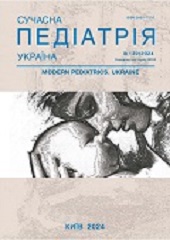Coffin-Siris syndrome - one syndrome with various genetic variants and phenotypes
DOI:
https://doi.org/10.15574/SP.2024.139.123Keywords:
Coffin-Siris syndrome, phenotype, SMARCA4, DPF2, developmental delay, rare diseases, childrenAbstract
Coffin-Siris syndrome encompasses a group of genetic disorders with a wide spectrum of phenotypic features, characterized by varying degrees of intellectual disability, developmental delay, and other clinical signs. Among the most common features are the aplasia or hypoplasia of the distal phalanx or nail of the fifth finger and coarse facial features.
The aim of the work is to increase awareness among physicians about the diagnosis of Coffin-Siris syndrome and expand knowledge of the spectrum of clinical features of the disease based on the presentation of two clinical cases.
We presented two clinical cases of Coffin-Siris syndrome caused by variants in the SMARCA4 and DPF2 genes. In both cases, there is a delay in speech development, cognitive impairments of varying severity, behavioral changes, characteristic dysmorphic features, and changes in the hands and/or feet, especially in the little finger. Distal phalanx nail hypoplasia of the fifth finger was present in the case associated with a variant in the DPF2 gene. In the patient with a variant in the SMARCA4 gene, flexion deformity of the little finger and broad palms were observed. Pachydermodactyly and a congenital kidney defect were also diagnosed in this patient.
Thus, genetic diagnosis allows for timely identification, preventing complications and avoiding unnecessary investigations. Accumulating clinical data on rare diseases and their systematization contribute to research development and, subsequently, to determining optimal therapeutic approaches. The identified genetic factor in the proband ensures genetic counseling for the family and determining risk indicators for pathologies in offspring.
The research was carried out in accordance with the principles of the Helsinki Declaration. The informed consent of the patient was obtained for conducting the studies.
No conflict of interests was declared by the authors.
References
Bögershausen N, Wollnik B. (2018). Mutational Landscapes and Phenotypic Spectrum of SWI/SNF-Related Intellectual Disability Disorders. Front Mol Neurosci. 11: 252. https://doi.org/10.3389/fnmol.2018.00252; PMid:30123105 PMCid:PMC6085491
Boyarchuk O, Kinash M, Hariyan T, Bakalyuk T. (2019). Evaluation of knowledge about primary immunodeficiencies among postgraduate medical students. Archives of the Balkan Medical Union. 54(1): 11-19. https://doi.org/10.31688/ABMU.2019.54.1.18
Boyarchuk O, Volyanska L, Kosovska T, Lewandowicz-Uszynska A, Kinash M. (2018). Awareness of primary immunodeficiency diseases among medical students. Georgian Med News. 285: 124-130.
Knapp KM, Poke G, Jenkins D, Truter W, Bicknell LS. (2019). Expanding the phenotypic spectrum associated with DPF2: A new case report. Am J Med Genet A. 179(8): 1637-1641. https://doi.org/10.1002/ajmg.a.61262; PMid:31207137
Li D, Ahrens-Nicklas RC, Baker J, Bhambhani V, Calhoun A, Cohen JS et al. (2020). The variability of SMARCA4-related Coffin-Siris syndrome: Do nonsense candidate variants add to milder phenotypes? Am J Med Genet A. 182(9): 2058-2067. https://doi.org/10.1002/ajmg.a.61732; PMid:32686290
Mardinian K, Adashek JJ, Botta GP, Kato S, Kurzrock R.(2021). SMARCA4: Implications of an Altered Chromatin-Remodeling Gene for Cancer Development and Therapy. Mol Cancer Ther. 20(12): 2341-2351. https://doi.org/10.1158/1535-7163.MCT-21-0433; PMid:34642211 PMCid:PMC8643328
McKnight D, Morales A, Hatchell KE, Bristow SL, Bonkowsky JL, Perry MS et al. (2022). Genetic Testing to Inform Epilepsy Treatment Management From an International Study of Clinical Practice. JAMA Neurol. 79(12): 1267-1276. https://doi.org/10.1001/jamaneurol.2022.3651; PMid:36315135 PMCid:PMC9623482
Schmetz A, Lüdecke HJ, Surowy H, Sivalingam S, Bruel AL, Caumes R et al.(2024). Delineation of the adult phenotype of Coffin-Siris syndrome in 35 individuals. Hum Genet. 143(1): 71-84. https://doi.org/10.1007/s00439-023-02622-5; PMid:38117302
Van der Sluijs PJ, Jansen S, Vergano SA, Adachi-Fukuda M, Alanay Y, AlKindy A et al. (2019). The ARID1B spectrum in 143 patients: from nonsyndromic intellectual disability to Coffin-Siris syndrome. Genet Med. 21(6): 1295-1307. https://doi.org/10.1038/s41436-018-0330-z; PMid:30349098 PMCid:PMC6752273
Vasileiou G, Vergarajauregui S, Endele S, Popp B, Büttner C, Ekici AB et al. (2018). Mutations in the BAF-Complex Subunit DPF2 Are Associated with Coffin-Siris Syndrome. Am J Hum Genet. 102(3): 468-479. https://doi.org/10.1016/j.ajhg.2018.01.014; PMid:29429572 PMCid:PMC5985265
Vasko A, Drivas TG, Schrier Vergano SA. (2021). Genotype-Phenotype Correlations in 208 Individuals with Coffin-Siris Syndrome. Genes (Basel). 12(6): 937. https://doi.org/10.3390/genes12060937; PMid:34205270 PMCid:PMC8233770
Witkowski L, Donini N, Byler-Dann R, Knost JA, Albrecht S, Berchuck A, et al. (2017). The hereditary nature of small cell carcinoma of the ovary, hypercalcemic type: two new familial cases. Fam Cancer. 16(3): 395-399. https://doi.org/10.1007/s10689-016-9957-6; PMid:27866340 PMCid:PMC5487815
Downloads
Published
Issue
Section
License
Copyright (c) 2024 Modern pediatrics. Ukraine

This work is licensed under a Creative Commons Attribution-NonCommercial 4.0 International License.
The policy of the Journal “MODERN PEDIATRICS. UKRAINE” is compatible with the vast majority of funders' of open access and self-archiving policies. The journal provides immediate open access route being convinced that everyone – not only scientists - can benefit from research results, and publishes articles exclusively under open access distribution, with a Creative Commons Attribution-Noncommercial 4.0 international license (СС BY-NC).
Authors transfer the copyright to the Journal “MODERN PEDIATRICS. UKRAINE” when the manuscript is accepted for publication. Authors declare that this manuscript has not been published nor is under simultaneous consideration for publication elsewhere. After publication, the articles become freely available on-line to the public.
Readers have the right to use, distribute, and reproduce articles in any medium, provided the articles and the journal are properly cited.
The use of published materials for commercial purposes is strongly prohibited.

